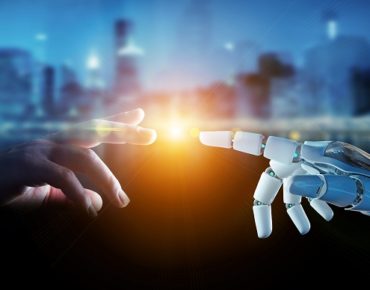The Future of Industrial-grade AI

The scope of artificial intelligence has dramatically widened in recent years as critical advancements in the field have resulted in its expansion across a variety of sectors, from healthcare and energy to construction and aerospace. AI has made tremendous strides in these areas with endless use cases on the horizon – from energy efficiency and sustainability, as the world targets a net zero future, to patient care predictions in the rapidly evolving healthcare ecosystem.
However, this has not always been the case, as artificial intelligence has typically been hidden away in technology-heavy fields such as data science and robotics. As AI solutions were developed and enhanced in labs over the past few decades, other industries caught on to the untapped potential of using AI and machine learning (ML) platforms for applications that weren’t merely science fantasy but hugely impactful on human life.
What is industrial-grade AI?
Industrial-grade AI is different from the AI solutions of the past — it is designed to be used by everyday workers in unmonitored environments. These solutions have domain-specific knowledge baked into their design to provide accurate, real-time recommendations to the workers they support. Industrial-grade AI is useful in enterprise environments, as opposed to research-grade and other forms of AI generated with the goal of replicating human intelligence.
Due to its inherent usefulness, industrial-grade AI has exploded into new sectors in recent years and is expected to continue growing as more organizations identify its value. In fact, the AI solutions market is expected to hit $500 billion next year, further solidifying the start of an AI-centric era. Today, there are several key sectors where industrial-grade AI is poised to make the biggest impact as new technologies come to life in 2022 and beyond.
New horizons for industrial-grade AI
As the use cases for artificial intelligence continue to expand beyond convention, there are several areas where industrial-grade AI will start to play a huge role in 2022. Across the healthcare sector, there is great potential for AI to energize technological progression in hospitals, especially considering the usefulness these technologies had for outbreak forecasting and streamlining patient care during the pandemic. With AI and ML solutions making vast amounts of data accessible to decision-makers, improved hospital administrative operations and enhanced predictive analysis accuracy are in store. AI can even empower physicians with relevant procedure recommendations and patient screening practices.
Digitalization efforts also come with promising prospects for the energy sector when it comes to more optimized, sustainable operations. The implementation of AI decision-support software in major refineries can aid facility operators with recommendations that close profitability gaps and improve efficiency. Similar technology is cropping up in the construction sector, where predictive maintenance tools leveraging sensors and other functional data can improve operations with recommended remedial actions. This can help operators make decisions involving industrial equipment maintenance, lingering operational problems, and even complications around unexpected plan deviations. In saving time and resources, AI is helping age-old industries advance their operations to achieve net-zero goals and meet growing regulations.
Artificial intelligence can also lessen the impact of the supply chain crisis and advance human exploration of Mars. The digital transformation of supply chain data and sensor analyses using AI, alongside revamped process automation and verification, will offer new levels of visibility and forecasting abilities. On Mars, AI is already in use with NASA’s Curiosity rover. The technology allows the rover to navigate the planet and cope with unplanned scenarios autonomously. With novel applications for AI and ML popping up seemingly every day, there’s no doubt that industrial-grade AI will continue to grow in functionality.
A peek into 2050
Thanks to the rapid pace of innovation paired with a growing need for efficient, sustainable operations, industrial AI has expanded into areas previously untouched by such technologies. With sustainability optimization in energy, procedure recommendations and patient screening in healthcare, Mars exploration in aerospace, equipment maintenance in construction, and a solution for the supply chain crisis, artificial intelligence is set to improve human life in many ways. While the world may see advancements in these areas take flight this year, there’s certainly more to come with the limitless possibilities that AI and ML bring.
As this progression continues, AI will likely push into even the most antiquated industries. The agriculture sector has started to see this transition occur, with John Deere’s self-driving tractor set to bring the farming industry into the future in the coming decades. Humans are already using self-driving cars and virtual assistance through automated bots like Siri, Google, and Amazon Alexa. With well-trained models and the right algorithms, human life will experience drastic changes as this technology continues to take off and becomes embedded in everyday tasks.
AJ Abdallat is CEO of Beyond Limits and on the advisory board for Caltech’s Center for Autonomous Systems and Technologies (CAST). Beyond Limits is a pioneering artificial intelligence engineering company creating advanced software solutions for the most demanding industries including energy, utilities, and healthcare. AJ has over 20 years’ experience building high-tech startups in the fields of bio-inspired artificial intelligence, reasoning systems and smart sensors. Prior to Beyond Limits, AJ was co-founder and CEO of several Caltech/Jet Propulsion Laboratory startups where he raised over $250M in venture and strategic investment. AJ holds a Master of Science degree in Engineering from the University of Missouri and a Bachelor of Science from the University of California at Berkeley.
Related
With over a decade’s experience covering the HPC space, Tiffany Trader is one of the preeminent voices reporting on advanced scale computing today.












